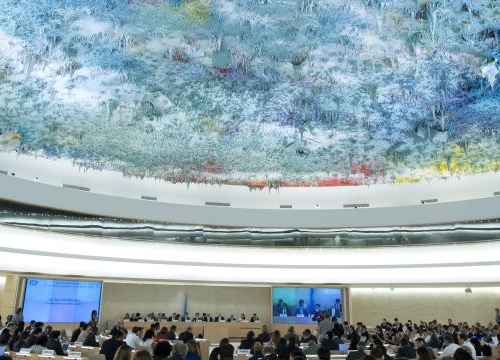New Paper Outlines Lessons from the UPR Process for the National Implementation of UN Treaty Bodies’ Recommendations


UN Photo / Jean-Marc Ferre
28 November 2019
The United Nations (UN) Universal Periodic Review (UPR) has brought new life into the measures taken at the international and national levels to hold states accountable to their international human rights law (IHRL) obligations. The UPR has also generated a number of new initiatives at national levels to implement recommendations emanating from the UPR process.
In the context of the upcoming review of UN treaty bodies (TBs) by the UN General Assembly (GA), the Research Brief The Universal Periodic Review Mid-Term Reporting Process: Lessons for the Treaty Bodies attempts to draw lessons from the UPR mid-term reporting process that can assist TBs in improving the impact of their work at the national level.
Written by Miloon Kothari, President of UPR Info and former UN Special Rapporteur on the right to adequate housing, it outlines a series of measures, inspired by the UPR, to strengthen the implementation of TBs concluding observations.
‘This report will be of interest to the various stakeholders involved in the UNGA 2020 review process, but also to the actors involved in the work of UN TBs: state parties to the treaties, members of the various committees, NGOs and staff in UN agencies interacting with the UN human rights system, as well as National Human Rights Institutions’ underlines Felix Kirchmeier, Executive Director of the Geneva Human Rights Platform.
UPR Follow-Up Mechanisms: Improving the Impact of TBs’ Work at the National Level
The Research Brief details a series of UPR good practices – the creation of stakeholder and multi-stakeholder mechanisms involving governments, National Human Rights Institutions (NHRIs), parliaments and civil society organizations; the development of national human rights action plans and the development of matrices and tools to track implementation – that can be of value for the follow-up of UN TBs’ concluding observations.
‘It is essential that during the discussions towards the reform of UN TBs, serious consideration is given to the many lessons that can be learnt from the follow-up processes spawned by the UPR’ underlines Miloon Kothari.
Towards a Consolidated Monitoring System at the National Level
The paper also calls, based on the UPR analysis, to move towards a consolidated national monitoring and implementation process for all recommendations emanating from the UN human rights system.
‘Some of this work is already taking place through the matrices developed to track the implementation of UPR recommendations as they also integrate UN TBs’ concluding observations and recommendations from UN Special Procedures, but there is a critical need for a better coordinated and mutually reinforcing approach’ stresses Miloon Kothari.
This will not only lead to a more coherent and coordinated UN human rights system, but also to an efficient national and comprehensive process that will reduce significantly the reporting burden on states, NHRIs and NGOs’ he adds.






